  | ||||
HOME |

I interviewed writer Nancy Kress on May 25 at Balticon [May 24–27, 2002] in Baltimore, MD. While we spoke, Ernest Lilley of SFRevu stopped by to take some photographs and exchange a few comments. Photos of Nancy are reproduced by permission of and copyrighted by Ernest Lilley. Can you talk about how living in Western New York State affected your writing? I didn't start writing until I moved to Rochester, so I'm not sure that living in Western New York made a difference. Except to say: We lived way out in the country, when I was married to my first husband and I was pregnant with my second child. We only had one car, and he took it to work during the day. And I was out there with a toddler, and pregnant, alone way out in the country, no other women around during the day and I was going quietly nuts, and then that's when I started writing. It was either that or watch soap operas, and there are just things to which we do not descend. So, I think you could say that the geography contributed. Why do you write? Would you say your goal is to make a living, entertain an audience, or something else? I write because that's the way I explore reality. I started writing because, as I said, I was going nuts, and it was a distraction. I've always read. Every writer I've ever met, read. I'd always told myself stories, but I never thought I'd write any down. All writers I'd ever read were dead, as far as I knew when I was a kid. It hadn't occurred to me to actually be a writer, but when I started, it progressed beyond distraction to a way to explore things that interest me, characters or ideas. Because of that, I never know the end of the story when I begin to write it, even for an entire novel, never mind a short story. Because I'm working it out, seeing where the issues take me, or where they take themselves, ideally. What are your recreations, the ways you regenerate your creative faculties? I read. I still read a lot. As a girl and a young woman, I used to read mostly fiction. Now, I read much more non-fiction, and that regenerates my faculties, as you put it. I just finished reading Michael Pollan's book on plants, The Botany of Desire, and there's notes all over it saying "what if? what if?" because non-fiction can really spark ideas. I read Robert Kaplan's Warrior Politics, and some of the ideas there led directly to a story that will be coming out in Asimov's in January [2003] called "The War on Treemon."
Let me start with the emotional basis. I need nine hours of sleep a night, and I bitterly resent it. I'm jealous of those people who get by on five or six hours. I wrote out of sheer jealousy. Way back in the late '70s, I wrote a story about people who don't sleep, and it was rejected by every magazine in the business, and by Robert Silverberg twice, because he had changed editorial seats in the meantime. So I retired it. FIve years later, I tried it again, and that time the story was so bad I didn't send it out. And then in 1990 [the novella version of] Beggars in Spain is actually the first thing I wrote after I went full-time as a writer. It came together for me, but it took that long to ferment in my hindbrain. We don't really know why we need sleep. One thing I did is read various theories of sleep, and I picked the one best suited to my needs. So there is some story behind it, but it's a big stretch. It's not like the carefully-researched plausible science that I had, say, in my novel Stinger. But there is some there. That isn't saying it's about sleep. In fact, it's less about the science of not sleeping than it is about the sociological questions of having a superior group. What's really interested me is what happens if you have, even in a modest sense, supermen among us.
Character. Henry James said, "Character is plot," and I believe him. Because if you have a character that you know, and that is interesting to you, then how that character responds to the situation you've set up grows out of his character, and what he does in turn becomes the plot. My husband [hard-SF writer Charles Sheffield—he died Nov. 2, 2002] would violently disagree, and in fact he does quite often. He thinks the science is the most important thing. He reads science fiction for new scientific ideas or twists on ideas, whereas I read for characters. But this is a large genre, and there's room for a lot of different kinds of SF. I wanted to ask what the difference was between teaching fourth-graders and teaching prospective writers at Clarion... It involves a lot less papier-maché! But seriously, I was wondering if you had a mentor or other important teacher on the subject of writing. No. The person I have always admired is Ursula Le Guin. I've only met her once. But I read her books over and over, trying to figure out how she did it. I still don't know.
I've had the privilege of teaching a number of very talented people. My best friend, Claudia Bishop, who's a mystery writer, was a student of mine, though not at Clarion. Mirian Grace Monfredo, another mystery writer, was also a student of mine. In the field, I've had the privilege of teaching Andy Duncan, Felicity Savage, Kelly Link, Nick diChario, and a number of other very accomplished people. One of the questions, though, is to what extent a teacher can really claim to have exerted any influence. Something you say might strike a certain student a certain way and just set the gears going, or you might spend an entire week with a student at Clarion and never say one thing that particularly strikes them, and then the next teacher may say something that presses their particular button. You can't ever really tell.
I also believe that most writers would become the same writers they are without formal instruction; the formal instruction merely provides some shortcuts to get you there faster, but they would discover by trial and error if they stuck with it long enough. My editor wanted me to ask: What sort of people are able to take six weeks off to attend a writing workshop? It's a good question. They're a mix. We get a lot of twentysomethings that have not yet settled into family and children. We get women in their forties and fifties whose kids are now grown and self-operating. I get retired men. And surprisingly, I get people in their thirties, forties, or fifties who have arranged their entire lives in order to come. Byron Tetrick, who was a student of mine at Clarion, is an airline pilot for Delta. It took him a year to build up enough seniority to bid for flights so that he could take six weeks off, and even then he had to leave one weekend because the FAA requires the pilots to fly at least once a month. He was willing to do it because he wanted to be there. The older people do make sacrifices in order to rearrange children and jobs and careers. It's easier for the younger ones, of course, although what tends to be the problem for them is the money. But they're a pretty mixed bunch. My preferred form would be a novella. If I had my druthers then I'd write nothing but novellas, but you can't make a living with that. I approach it by having in my head two things: the character and the situation. Not the plot, but the situation. For example, when I wrote Beggars in Spain I knew that I had Leisha, and I knew that she didn't sleep, that she'd been genetically engineered not to sleep, that she was a very rich girl, that her father had wanted this and her mother had not. I didn't know anything else. As I wrote, I didn't realize until I got there that she was going to have a twin who was not engineered, where the two eggs had been fertilized differently. And I was surprised when I found it out. That's one of the reasons I write: the pleasure of discovering what I'm going to say. Then I try to ask myself a series of questions as I'm writing. One of them is, "Okay, what would she do next?" Given who this person is, who is she, and then given this situation, would would this person logically do? Another question that's standard is, "What can go wrong?" Because fiction is about stuff that gets screwed up, so you look for what can go wrong. And another question is, "What's standing in their way?" And the biggie, "What do these people want?" Not just the main character, but the other characters: What did Jennifer Sharifi want, what does Tony Indivino want? They want different things, and that alone will begin to generate where their things come into conflict. So essentially, I worked my way through, hoping like hell that it's going to come together at the end. I have to admit a certain number of them don't, and they just die, so it's not an efficient way to write. But it's the only way I seem to be able to write. Are you more hopeful or fearful about the future? I have a book coming out in November of 2003 from Golden Griffin Press called Nothing Human. It takes its title from the quote by Terence, "I am a man. Nothing human is alien to me." In the book, I destroy the entire human race-or rather, the human race destroys itself. What happens is that the planet gets into the worst-case scenarios with global warming, with bacteria that outpace us, biowarfare, all kinds of things, and then they all get into feedback loops. Eventually the planet becomes uninhabitable. Humanity genetically engineers its descendants into something that can survive here, but they're not human. When I finished this novel, Tor turned it down as too grim, which is why it's being published by Golden Griffin Press. I thought it was a happy ending! My husband said, "It was a Childhood's End for the '90s, except that you left the planet intact, which Clarke didn't." But my editor didn't see it that way. Are you considering a return to the field of fantasy? No. I wrote three fantasy books, and then I started writing science fiction. I don't know why anything has happened in my career; none of it is planned. It just sort of happened. Winning the Nebula and Hugo awards, it seems to be working for you. Have you thought about writing for other genres? Not really. I've done an occasional mystery for an anthology. And that's another thing: I don't know why, when I started writing, that it came out as science fiction. I had always read more mainstream fiction than I do science fiction. But that's what happened. | |||
Interviews, Speeches, Articles | Voyageur Home Upcoming Events & Conventions | Club History Main Site Editor & Site Problems IDIC Home Copyright © 2002, Infinite Diversity International Corporation. All rights reserved. | ||||
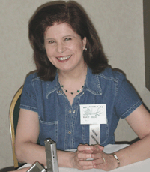 By Alex von Thorn
By Alex von Thorn Your premise in Beggars in Spain about people who don't sleep is fascinating. But is this just a literary conceit, like faster-than-light travel, or could you talk about the scientific basis for it?
Your premise in Beggars in Spain about people who don't sleep is fascinating. But is this just a literary conceit, like faster-than-light travel, or could you talk about the scientific basis for it?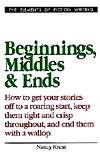 I've really enjoyed your articles in Writer's Digest, and your book Beginnings, Middles, and Ends [1993]. Of all the tips and techniques you've recommended over the years, what would you say is the most important element in creating a great story?
I've really enjoyed your articles in Writer's Digest, and your book Beginnings, Middles, and Ends [1993]. Of all the tips and techniques you've recommended over the years, what would you say is the most important element in creating a great story?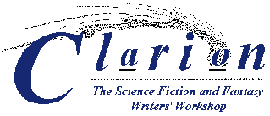 With your role in leading writing workshops at Clarion, I wanted to ask who your favourite students have been, in terms of their writing.
With your role in leading writing workshops at Clarion, I wanted to ask who your favourite students have been, in terms of their writing.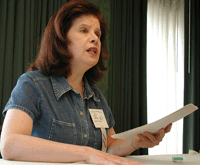 How do you approach the task of building a story?
How do you approach the task of building a story?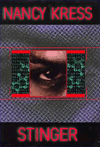 So I think the future will be exceedingly strange. I don't think it will be more of the same, and I wish I could live 1,000 years to see what happens. But I don't think it's bad if it becomes strange, or even if it becomes non-human. I don't see why it's important that every species continue, as long as they've left a mark. And I think we have.
So I think the future will be exceedingly strange. I don't think it will be more of the same, and I wish I could live 1,000 years to see what happens. But I don't think it's bad if it becomes strange, or even if it becomes non-human. I don't see why it's important that every species continue, as long as they've left a mark. And I think we have.